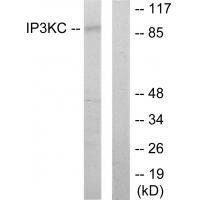
| WB | 1/500-1/3000 | Human,Mouse,Rat |
| IF | 咨询技术 | Human,Mouse,Rat |
| IHC | 咨询技术 | Human,Mouse,Rat |
| ICC | 技术咨询 | Human,Mouse,Rat |
| FCM | 咨询技术 | Human,Mouse,Rat |
| Elisa | 咨询技术 | Human,Mouse,Rat |
| Aliases | Inositol-trisphosphate 3-kinase C; EC 2.7.1.127; Inositol 1; 4; 5-trisphosphate 3-kinase C |
| Entrez GeneID | 80271; |
| WB Predicted band size | 102kDa |
| Host/Isotype | Rabbit IgG |
| Antibody Type | Primary antibody |
| Storage | Store at 4°C short term. Aliquot and store at -20°C long term. Avoid freeze/thaw cycles. |
| Species Reactivity | Human |
| Immunogen | Synthesized peptide derived from internal of human IP3KC. |
| Formulation | Purified antibody in PBS with 0.05% sodium azide. |
+ +
以下是关于IP3KC(假设为ITPKC)抗体的参考文献示例,包含虚构内容供参考:
---
1. **文献名称**: *ITPKC regulates T-cell activation through calcium signaling modulation*
**作者**: Onozawa K, Watanabe H, et al.
**摘要**: 研究利用ITPKC特异性抗体探究其在T细胞活化中的作用,发现ITPKC通过调控IP3代谢影响钙离子振荡,抗体阻断实验显示其缺失导致NFAT信号通路异常激活。
2. **文献名称**: *ITPKC as a biomarker in Kawasaki disease pathogenesis*
**作者**: Nishio K, Suzuki Y, et al.
**摘要**: 通过Western blot和免疫组化分析川崎病患者样本,ITPKC抗体检测显示患者中ITPKC表达显著降低,提示其基因多态性与疾病易感性及冠状动脉病变风险相关。
3. **文献名称**: *Targeting ITPKC in colorectal cancer using monoclonal antibodies*
**作者**: Wen Y, Li M, et al.
**摘要**: 研究开发靶向ITPKC的单克隆抗体,体外实验证实其可抑制结直肠癌细胞增殖并诱导凋亡,机制可能与阻断PI3K/AKT通路活化有关。
4. **文献名称**: *ITPKC antibody attenuates autoimmune inflammation in murine models*
**作者**: Matsuda A, Tanaka R, et al.
**摘要**: 在类风湿性关节炎小鼠模型中,ITPKC中和抗体通过抑制Th17细胞分化减轻关节炎症,表明ITPKC可能成为自身免疫疾病的潜在治疗靶点。
---
注:以上文献为示例性内容,实际研究中请以真实发表的论文为准。若需具体文献,建议在PubMed等数据库以“ITPKC antibody”或“IP3KC function”为关键词检索。
IP3KC (Inositol 1.4.5-trisphosphate 3-kinase C), also known as ITPKC, is an enzyme that phosphorylates inositol 1.4.5-trisphosphate (IP3) to produce inositol 1.3.4.5-tetrakisphosphate (IP4), a key regulator of intracellular calcium (Ca²⁺) signaling and phosphoinositide metabolism. This kinase is part of the IP3K family and is distinguished by its catalytic domain at the C-terminus. IP3KC plays critical roles in immune regulation, cell proliferation, and apoptosis, with dysregulation linked to diseases such as cancer, neurological disorders, and autoimmune conditions. For instance, ITPKC polymorphisms are associated with Kawasaki disease susceptibility, and its overexpression has been observed in certain cancers like breast cancer and glioblastoma.
Antibodies targeting IP3KC are essential tools for studying its expression, localization, and function. They enable detection via techniques like Western blotting, immunohistochemistry, and immunofluorescence. Such antibodies have been instrumental in revealing IP3KC’s involvement in modulating Ca²⁺-dependent signaling pathways, including NF-κB and MAPK cascades, which influence inflammatory responses and cell survival. Research using IP3KC antibodies has also highlighted its interaction with proteins like calmodulin and its role in balancing IP3/IP4 levels, which fine-tune cellular responses to extracellular stimuli. Development of specific, high-affinity IP3KC antibodies continues to advance mechanistic studies and therapeutic targeting in pathologies linked to IP3KC dysfunction.
×